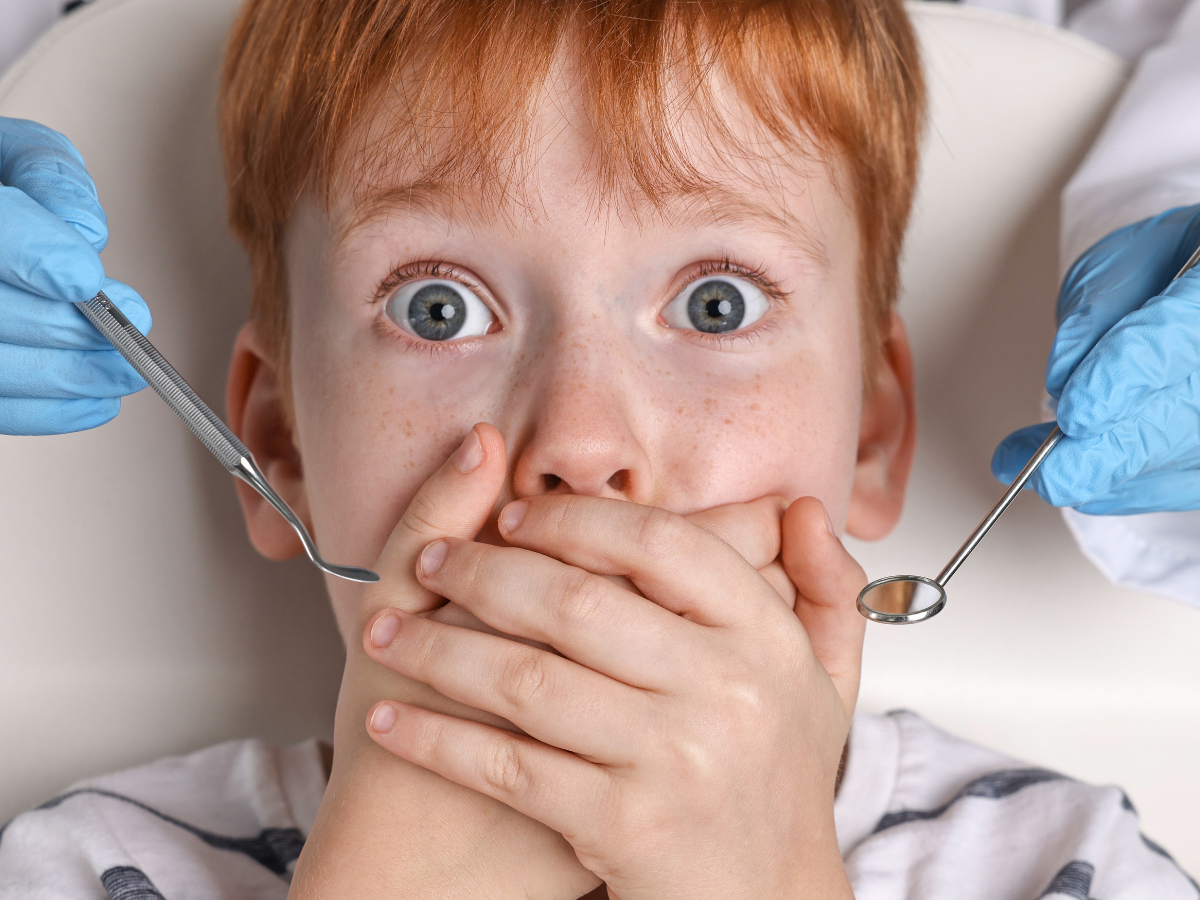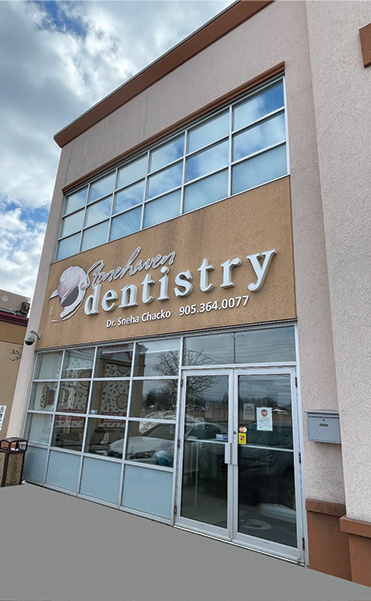Our Blog
Emergency Dentist: Children's Dental Emergencies
October 19, 2025 / Dentistry

Pediatric Dental Emergencies: When to See an Emergency Dentist
Dental emergencies can happen to children at any time
Often when parents least expect them, knowing when to seek an emergency dentist can make the difference between saving and losing a tooth. At Stonehaven Dentistry in Mississauga, the team understands that pediatric dental emergencies require special care, patience, and immediate attention to ensure the best possible outcomes for young patients.
Common Childhood Injuries That Need an Emergency Dentist
Children are naturally active and curious, which can lead to various dental injuries. Recognizing which situations require immediate attention from an emergency dentist helps parents respond appropriately.
- Knocked-Out Permanent Teeth: A knocked-out permanent tooth represents one of the most urgent dental emergencies. Time is critical in these situations. Parents should locate the tooth immediately and handle it only by the crown. Never touch the root. Rinse the tooth gently with water if dirty. Try to reinsert it into the socket if possible. If reinsertion is not possible, place the tooth in milk or saliva. Contact an emergency dentist within 30 minutes for the best chance of saving the tooth.
- Chipped or Broken Teeth: Chips and breaks are common childhood dental injuries. While not always emergencies, significant breaks that expose the tooth's inner layers require prompt attention. An emergency dentist can assess the damage and provide appropriate treatment to prevent infection and further damage.
- Dental Avulsion of Baby Teeth: Unlike permanent teeth, knocked-out baby teeth are not typically reinserted. However, parents should still contact an emergency dentist to ensure no fragments remain. The dentist will check for damage to developing permanent teeth underneath.
- Severe Toothaches: Persistent, severe tooth pain in children often indicates infection or decay. An emergency dentist can diagnose the cause and provide relief through appropriate treatment.
- Soft Tissue Injuries: Cuts to the lips, tongue, or cheeks that bleed heavily may require emergency care. While these injuries often look worse than they are, an emergency dentist can determine if stitches are needed.
How an Emergency Dentist Treats Children Differently
Pediatric dental emergencies require specialized approaches that differ from adult emergency care. An experienced emergency dentist adapts treatment methods to accommodate children's unique physical and emotional needs.
- Physical Considerations: Children's teeth and jaws are still developing. An emergency dentist must consider this growth when planning treatments. Primary teeth have different structures than permanent teeth. Treatment approaches must account for these differences. The emergency dentist also considers how current treatment might affect future dental development.
- Pain Management: Children metabolize medications differently than adults. An emergency dentist carefully calculates appropriate dosages based on the child's age and weight. Local anesthetics are administered using techniques that minimize discomfort. Topical numbing agents are often applied before injections to reduce pain.
- Treatment Duration: Young children have shorter attention spans and less tolerance for lengthy procedures. An emergency dentist works efficiently to complete necessary treatments quickly. When possible, treatments are broken into shorter appointments to accommodate the child's needs.
- Communication Style: An effective emergency dentist uses age-appropriate language when explaining procedures to children. Complex dental terms are replaced with simple, non-threatening words. Visual aids and demonstrations help children understand what will happen during treatment.
When to Contact an Emergency Dentist for Your Child
Parents often struggle to determine which situations require immediate emergency care. Understanding the signs that warrant a call to an emergency dentist helps ensure children receive timely treatment.
Immediate Emergency Situations:
- Knocked-out permanent teeth
- Severe bleeding that does not stop after 10 minutes of pressure
- Suspected jaw fractures
- Teeth that are significantly loosened or displaced
- Severe swelling of the face or gums
- High fever accompanying dental pain
Urgent But Not Immediate:
- Minor chips without pain
- Lost fillings or crowns
- Mild to moderate toothaches
- Small cuts to soft tissues that have stopped bleeding
The team at Stonehaven Dentistry, located at 7470 Airport Rd., Unit 2, Mississauga, ON, L4T 2H5, can help parents determine the urgency of their child's situation over the phone.
Calming Anxious Children During Emergency Dentist Visits
Dental emergencies are stressful for both children and parents. An experienced emergency dentist understands that managing a child's anxiety is crucial for successful treatment.
- Parent's Role in Staying Calm: Children take emotional cues from their parents. When parents remain calm and reassuring, children are more likely to stay composed. Speak in a soothing, confident tone. Avoid showing panic or distress, even if the injury looks serious.
- Distraction Techniques: An emergency dentist may use various distraction methods during treatment. These can include counting games, storytelling, or allowing the child to hold a comfort item. Some practices offer headphones with music or videos to help children focus on something other than the procedure.
- Positive Reinforcement: Praising children for their bravery during emergency visits helps create positive associations. An emergency dentist often celebrates small victories throughout the appointment. This approach builds confidence and reduces anxiety about future dental visits.
- Preparation Strategies: Before arriving at the emergency dentist office, parents can prepare children by explaining what will happen in simple terms. Avoid using scary words like “pain” or “hurt.” Instead, use phrases like “the dentist will help your tooth feel better.”
Preventing Common Childhood Dental Emergencies
While not all dental emergencies can be prevented, parents can take steps to reduce risks. An emergency dentist often provides guidance on protective measures for active children.
- Mouthguards for Sports: Custom-fitted mouthguards protect teeth during contact sports and high-impact activities. These devices significantly reduce the risk of dental injuries. An emergency dentist can create properly fitted mouthguards that children will actually wear.
- Childproofing Strategies: Remove hazards that could cause falls and dental injuries. Secure furniture that children might climb. Use safety gates on stairs. Pad sharp corners on tables and countertops.
- Dietary Considerations: Limit hard candies and foods that can crack teeth. Avoid giving young children foods they might choke on. These precautions reduce the likelihood of needing an emergency dentist.
What to Expect During an Emergency Dentist Visit
- Initial Assessment: The emergency dentist begins with a thorough examination of the injury. X-rays may be necessary to assess damage to roots and surrounding bone. The dentist explains findings to parents and discusses treatment options.
- Treatment Options: Depending on the injury, the emergency dentist may provide various treatments. These can include tooth reimplantation, splinting, filling placement, or extraction. The dentist prioritizes treatments that preserve natural teeth whenever possible.
- Follow-Up Care: After emergency treatment, the emergency dentist provides detailed instructions for home care. Follow-up appointments are scheduled to monitor healing and ensure proper recovery. Parents receive guidance on pain management and signs of complications to watch for.
Age-Specific Considerations for Emergency Dentist Care
- Toddlers and Preschoolers: Very young children may not understand what is happening during an emergency. The emergency dentist uses simple language and quick procedures when possible. Parent presence during treatment often helps calm toddlers.
- School-Age Children: Children in this age group can understand more detailed explanations. The emergency dentist involves them in the process while maintaining a gentle, reassuring approach.
- Teenagers: Adolescents may feel embarrassed about dental injuries, especially if they affect appearance. The emergency dentist addresses both physical and emotional concerns during treatment.
Dental emergencies involving children require prompt, specialized care from a qualified emergency dentist. At Stonehaven Dentistry, the team is equipped to handle pediatric dental emergencies with compassion and expertise. Parents can contact the practice at 905-364-0077 for immediate assistance when their child experiences a dental emergency.
Family Dentist: Preventive Care Strategies
September 19, 2025 / Dentistry

Choosing the Right Family Dentist
Choosing the right family dentist ensures every household member receives proper oral health care throughout their lifetime. At Stonehaven Dentistry in Mississauga, the team understands that preventive care strategies must evolve as families grow. A skilled family dentist provides customized approaches that address unique needs of toddlers, teenagers, adults, and seniors under one roof.
Why Your Family Dentist Recommends Age-Specific Care
Different life stages require different preventive strategies. A comprehensive family dentist recognizes that a two-year-old's oral health needs differ significantly from those of teenagers or grandparents. This understanding allows dental professionals to create targeted prevention plans that maximize effectiveness for each family member.
Preventive care remains the most cost-effective approach to maintaining oral health. When a family dentist implements age-appropriate strategies early, families avoid costly treatments later. This proactive approach benefits both oral health outcomes and household budgets.
Toddler and Preschooler Care from Your Family Dentist
Young children require special attention from their family dentist to establish healthy habits early. During these formative years, parents play a crucial role in implementing preventive strategies recommended by dental professionals.
Toddler Oral Care Strategies:
- Use a soft-bristled toothbrush designed for small mouths
- Apply a rice-grain-sized amount of fluoride toothpaste
- Brush twice daily with parental supervision and assistance
- Begin flossing when teeth touch each other
- Schedule first dental visits by age one
Preschooler Developments:
As children grow, their family dentist adjusts recommendations accordingly. Preschoolers can begin learning proper brushing techniques while parents continue to supervise. This age group benefits from educational materials that make oral hygiene fun and engaging.
The family dentist at Stonehaven Dentistry in Mississauga provides parents with demonstration techniques. Take-home materials reinforce proper oral care habits between appointments.
School-Age Children and Your Family Dentist
Elementary school children face unique oral health challenges as permanent teeth begin erupting. A proactive family dentist implements specific preventive treatments during this critical period.
Dental Sealants:
Sealants represent one of the most effective preventive treatments for school-age children. These thin, protective coatings are applied to chewing surfaces of permanent molars. They prevent decay in deep grooves where toothbrush bristles cannot reach effectively.
The family dentist typically recommends sealants as soon as permanent molars erupt. This usually occurs around ages six and twelve. This timing provides maximum protection during years when children are most susceptible to cavities.
Fluoride Treatments:
Professional fluoride applications strengthen tooth enamel and provide additional protection against decay. The family dentist may recommend these treatments every six months for children at higher risk of cavities.
Orthodontic Evaluation:
Early orthodontic assessment allows the family dentist to identify potential alignment issues. While treatment may not begin immediately, early detection enables better treatment planning.
Teenage Oral Health and Your Family Dentist
Adolescence brings unique oral health challenges that require specialized attention from a knowledgeable family dentist. Hormonal changes, dietary habits, and lifestyle factors all impact teenage oral health.
Hormonal Influences: Teenage hormones can increase gum sensitivity and inflammation. The family dentist educates teenagers about these changes. They emphasize the importance of consistent oral hygiene during this period.
Dietary Counseling: Many teenagers consume more sugary drinks and snacks than younger children. A caring family dentist provides nutrition education. This helps teenagers understand how their food choices affect their oral health.
Orthodontic Treatment: Many teenagers receive orthodontic treatment during these years. The family dentist coordinates care with orthodontists. They provide specialized cleaning techniques for patients with braces.
Adult Preventive Care from Your Family Dentist
Adults require different preventive approaches as their oral health needs evolve. A comprehensive family dentist addresses the changing needs of adult patients while maintaining focus on prevention.
Periodontal Health: Gum disease becomes more common as adults age. The family dentist monitors periodontal health closely. They may recommend more frequent cleanings for patients showing early signs of gum disease.
Professional Cleanings: Most adults benefit from professional cleanings every six months. However, the family dentist may recommend more frequent visits for patients with risk factors. These include diabetes, smoking, or family history of gum disease.
Oral Cancer Screening: Regular oral cancer screenings become increasingly important as adults age. The family dentist performs these screenings during routine appointments. They check for any unusual changes in oral tissues.
Family-Wide Nutrition Counseling
Nutrition affects every family member's oral health. A knowledgeable family dentist provides guidance that benefits the entire household.
Foods That Promote Oral Health:
- Dairy products rich in calcium and phosphorus
- Leafy green vegetables containing essential vitamins
- Lean proteins that support tissue health
- Fresh fruits and vegetables that stimulate saliva production
- Water as the primary beverage choice
Foods to Limit:
- Sugary snacks and beverages
- Sticky candies that cling to teeth
- Acidic foods and drinks that erode enamel
- Processed foods high in refined carbohydrates
Lifestyle Modifications for Better Oral Health
Beyond nutrition, several lifestyle factors impact family oral health. A proactive family dentist addresses these areas during appointments. They provide practical recommendations for improvement.
Tobacco Cessation: For adult family members who use tobacco, the family dentist provides resources and support for cessation efforts. Tobacco use significantly increases risks of gum disease, oral cancer, and tooth loss.
Sports Protection: Active family members benefit from custom mouthguards during sports participation. The family dentist can create properly fitted protective devices that prevent dental injuries.
Stress Management: Stress can contribute to teeth grinding, jaw clenching, and poor oral hygiene habits. The family dentist helps identify stress-related oral health issues. They provide management strategies that work.
Creating Family Oral Health Routines
Successful preventive care requires consistent daily habits. The family dentist helps families establish routines that work for their specific schedules and needs.
Morning and Evening Routines: Establishing consistent brushing and flossing times helps ensure that oral hygiene becomes automatic. The family dentist provides scheduling suggestions that fit busy family lifestyles.
Regular Dental Appointments: Scheduling family appointments together can make dental visits more convenient. This approach is less stressful for children. The family dentist at Stonehaven Dentistry accommodates family scheduling preferences whenever possible.
Senior Oral Health Considerations
Older family members face unique oral health challenges. A caring family dentist adapts preventive strategies to address age-related changes and health conditions.
Medication Effects: Many seniors take medications that can affect oral health. The family dentist reviews medication lists during appointments. They provide recommendations to minimize negative effects on teeth and gums.
Dry Mouth Management: Reduced saliva production is common among seniors. The family dentist suggests strategies to manage dry mouth symptoms. These include special rinses and increased water intake.
Comprehensive preventive care from a dedicated family dentist provides the foundation for lifelong oral health. At Stonehaven Dentistry, located at 7470 Airport Rd., Unit 2, Mississauga, ON, L4T 2H5, families receive personalized care. This care evolves with their changing needs. Contact the practice at 905-364-0077 to schedule appointments or reach out online. Begin implementing age-appropriate preventive strategies for every family member today.
Archive

October 19, 2025

September 19, 2025

August 6, 2025

July 24, 2025






